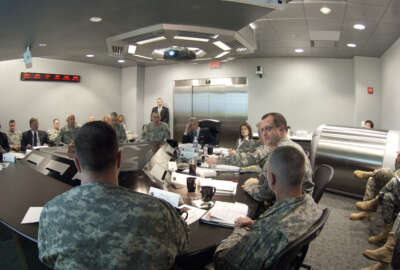

The House's version of the annual Defense policy bill would let the military onboard new officers with outside cyber expertise up to the rank of Army colonel or...
Best listening experience is on Chrome, Firefox or Safari. Subscribe to Federal Drive’s daily audio interviews on Apple Podcasts or PodcastOne.
Last fall, when the Army announced it was launching a direct commissioning program to attract civilian cyber experts into its officer corps, officials said they wanted to start small. The fast-track program, which is designed to attract software engineers, developers and security pros who might not otherwise consider military service, would only commission five officers in its first year.
As it turns out, five may have been too ambitious a goal. Earlier this month, the Army granted its first set of commissions under the new program. It selected just two out of more than 80 applicants, and both of them have previously served in uniform.
The low uptake rate is another potential indicator of a problem multiple senior military officials have already acknowledged: under current law, the services are only allowed to count applicants’ outside expertise for up to three years of “constructive credit” when assigning them their first military ranks.
In most cases, that’s meant the highest pay grade they can offer is first lieutenant, in the case of the Army, Air Force and Marine Corps, or lieutenant junior grade in the Navy. In other words, base pay of roughly $43,000 per year for people who are already trained in one of the most competitive career fields in the U.S. economy.
That may be about to change, however. The version of the annual Defense authorization bill currently making its way through the House of Representatives would boost the amount of credit the military can grant for private sector experience or advanced education, letting them grant cyber direct commissions up to the rank of O-6, an Army colonel or Navy captain.
A theoretical candidate starting as an O-6 would get approximately $80,000 per year in base pay. In a high-cost living area like Washington, D.C., the housing allowance included at that rank would provide an additional $40,000.
The provision, which was initially requested by the Pentagon, was inserted into the bill by the House Armed Services subcommittee on personnel. Thus far, no lawmakers have filed amendments in opposition to the proposal, making it likely that it will survive at least a vote of the full House.
The change would also make it easier for DoD to use the authority. Currently, the military services have to attest that they have a “critical shortage” of officers with cyber expertise before offering direct commissions to outsiders. The legislation would remove the word “critical.”
The Pentagon estimates the change would draw in roughly 85 new officers each year: 10 in the Army, 25 in the Navy and 50 in the Air Force.
Aside from making it easier for the military services to attract civilian experts, the Defense Department argues it the proposal would cost nothing to implement. In fact, because of the way the military’s pay scales work, it would most likely save a small amount of money — about $1 million per year.
That’s because federal law limits the number of officers that can be serving on active duty at any given time. Since the newly-commissioned officers’ salaries would be set at the within-grade pay scales for less than two years of service, they would be replacing slots the military services are currently using for officers who have more time in service, and whose base pay is higher. The difference amounts to about $48,000 per year for a theoretical O-6 with 22 years of service, compared to a new officer who’s just beginning their military career at that rank.
Gen. Paul Nakasone, who became the new commander of U.S. Cyber Command earlier this month, testified at his confirmation hearing in March that the rank limitations of the current program do seem to be a barrier.
“If you are a high-end big data or forensics malware analyst, being able to get more credit for that service to bring you in at a higher rank will allow us to probably bring in higher level of talent,” said Nakasone, who was then the commander of Army Cyber Command. “This is an early program, but that’s the early results that we’ve seen.”
Vice Adm. Robert Burke, the chief of naval personnel, expressed a similar sentiment during a panel discussion last month, saying the military can’t hope to compete with private sector IT salaries under the current program.
“However, the mission is a draw. People want to do this because service to the nation is important to them,” he said. “So we don’t have to pay dollar for dollar, but we do sort of have to be in the ballpark, maybe the right number of digits, for example. So a little more time in grade credit, and being able to lateral-enter as an officer for those kind of software engineering skills would be the right help that we would be seeking.”
If Congress does nothing, the military will lose its cyber direct commissioning program altogether. The existing authority was created as a pilot program, and is set to expire on Dec. 31.
Copyright © 2025 Federal News Network. All rights reserved. This website is not intended for users located within the European Economic Area.
Jared Serbu is deputy editor of Federal News Network and reports on the Defense Department’s contracting, legislative, workforce and IT issues.
Follow @jserbuWFED


